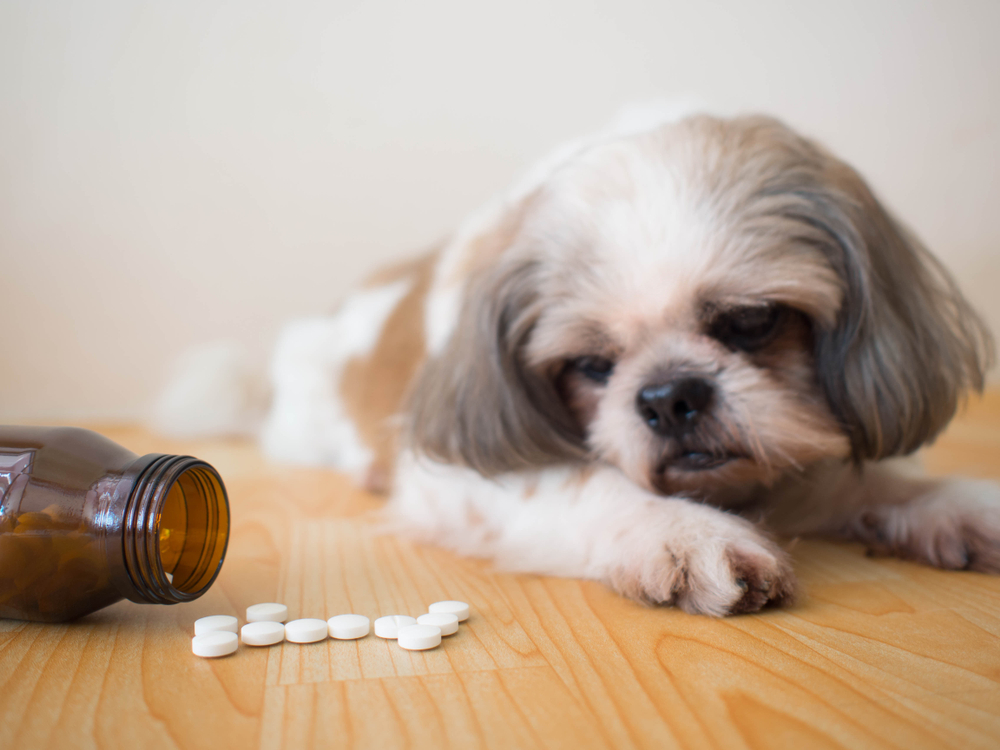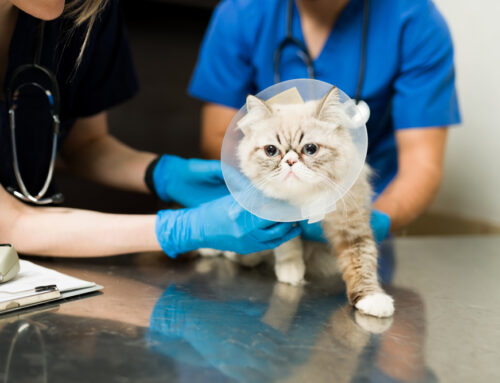When you have a headache or a bout of gastrointestinal upset, you reach into your medicine cabinet and take an over-the-counter (OTC) product to treat your ailment. When your four-legged friend develops a limp or an episode of vomiting and diarrhea, you cannot safely do the same. While some human medications are used off-label for pets, many are dangerous or downright deadly for cats and dogs. Learn which common human medications are best kept out of your pet’s paws from our Stack Veterinary Hospital team.
Hazardous human medications for pets
When in doubt, assume any human medication is hazardous for your pet. While not all medications may be harmful when administered at the correct dose, many are, including:
- Nonsteroidal anti-inflammatory drugs (NSAIDs) — Ibuprofen, naproxen, and aspirin belong to a class of medications called nonsteroidal anti-inflammatory drugs (NSAIDs), which can cause severe stomach ulcers, kidney failure, and liver damage in pets. A small dose can be toxic to dogs and cats.
- Acetaminophen — Acetaminophen is toxic to cats, causing damage to their red blood cells and liver. Dogs are also sensitive to acetaminophen, and ingestion can lead to liver failure and other serious complications.
- Antidepressants — Selective serotonin reuptake inhibitors (SSRIs) and tricyclic antidepressants can cause neurological problems, tremors, seizures, and serotonin syndrome—a potentially life-threatening condition—in pets.
- ADHD medications — Stimulant medications like Adderall and Ritalin can cause an elevated heart rate, tremors, seizures, and death in pets.
- Sleep aids — Sleep aids can cause disorientation, agitation, vomiting, and potentially fatal changes in heart rate and blood pressure in pets.
- Antihistamines — While some antihistamines are prescribed by veterinarians for pets, certain types, such as diphenhydramine and loratadine, can be toxic in high doses. Antihistamine toxicity signs in pets may include lethargy, vomiting, diarrhea, rapid heart rate, and seizures.
- Muscle relaxants — Medications like cyclobenzaprine and baclofen can cause central nervous system depression, leading to weakness, lethargy, coma, and respiratory depression in pets.
- Blood pressure medications — Drugs used to treat hypertension in humans, such as calcium channel blockers, beta blockers, and ACE inhibitors, can cause dangerously low blood pressure and other adverse effects in pets.
- Opioids — Medications like oxycodone, hydrocodone, and morphine are highly potent and can cause respiratory depression, sedation, and death in pets if ingested accidentally or administered for pain.
- Diabetes medications — Insulin and oral hypoglycemic agents used to treat diabetes in people can lead to dangerously low blood sugar levels in pets, resulting in weakness, seizures, and coma.
- Thyroid medications — Synthetic thyroid hormones are used to treat hypothyroidism in people and pets, but the dose is vastly different. Thyroid medication ingestion by pets can lead to hyperthyroidism, causing an increased heart rate, restlessness, panting, and potential cardiac arrhythmias.
- Chemotherapy drugs — Chemotherapy medications used to treat cancer in people are extremely toxic to pets and can cause severe gastrointestinal upset, bone marrow suppression, and organ damage.
Toxic human supplements for pets
While vitamins and supplements are generally considered safe for people when taken as directed, they can pose risks to pets if administered inappropriately. Here are some considerations regarding vitamins and supplements for pets:
- Iron supplements — Iron supplements, commonly found in prenatal vitamins and certain multivitamin formulations, can be toxic to pets, especially in high doses. Iron poisoning in pets can lead to gastrointestinal upset, liver damage, and death.
- Calcium supplements — Excessive calcium supplementation can disrupt the delicate balance of calcium and phosphorus in pets, leading to skeletal abnormalities, urinary tract issues, and kidney damage. Calcium supplements should only be given to pets under veterinary guidance.
- Vitamin D — Vitamin D toxicity can occur in pets if they ingest large amounts of the supplements intended for people. Vitamin D toxicity signs include vomiting, diarrhea, increased thirst and urination, weakness, and kidney failure.
- Herbal supplements — Many herbal supplements marketed for people may contain ingredients that are toxic to pets. Common herbs such as garlic, onions, and certain essential oils can be harmful or lethal to pets if ingested in sufficient quantities.
What to do if your pet ingests human medication

If you suspect your pet has ingested any human medication, it’s crucial to act quickly by following these steps:
- Contact a veterinarian — Contact our Stack Veterinary Hospital veterinarian immediately, or call an emergency veterinary hospital or animal poison control center for help. Provide as much information as possible about the medication ingested, including the name, strength, and amount consumed.
- Follow veterinary advice — Although your first instinct may be to induce vomiting in your pet, it could worsen the situation. Follow your veterinarian’s advice carefully to minimize toxicity.
- Monitor your pet closely — Keep a close eye on your pet for any signs of cardiac or respiratory distress. Be prepared to provide first aid if necessary.
While it’s natural to want to alleviate your pet’s discomfort, giving them human medications can have severe and potentially fatal consequences. Always err on the side of caution and seek veterinary advice before administering any medication to your pet by giving our Stack Veterinary Hospital team a call.







Leave A Comment